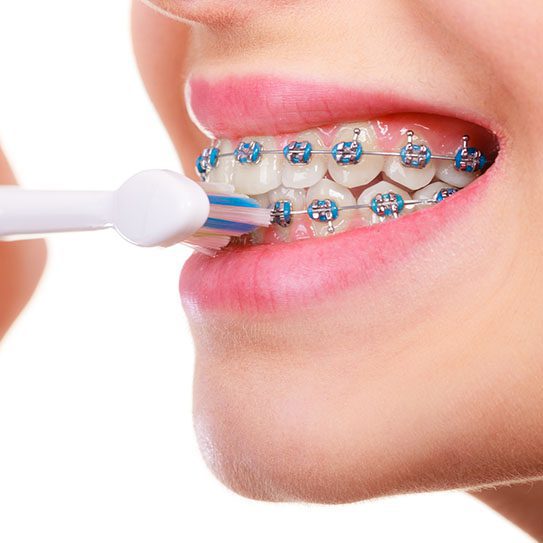Oral Health Tips for Braces Lawrenceville Patients

Oral Health During Orthodontic Treatment
Maintaining excellent oral health during orthodontic treatment is crucial for achieving the best possible results and ensuring your smile stays healthy throughout the process. Whether you’re wearing traditional braces Lawrenceville patients trust or have chosen clear aligners, proper oral hygiene becomes even more important when you’re actively moving your teeth into their ideal positions. At My Orthodontist in Lawrenceville, we emphasize that successful orthodontic treatment depends not only on the expertise of your orthodontist but also on your commitment to maintaining optimal oral health every day.
Understanding how orthodontic appliances affect your daily oral care routine and knowing the right techniques to keep your teeth and gums healthy can make all the difference in your treatment experience. Let’s explore the essential aspects of maintaining oral health during orthodontic treatment and discover practical strategies that work for both braces and Invisalign patients.
The Importance of Oral Hygiene During Orthodontic Treatment
Orthodontic appliances create additional spaces where food particles and plaque can accumulate, making thorough cleaning more challenging but also more critical. When plaque builds up around braces or isn’t properly removed from teeth during Invisalign treatment, it can lead to tooth decay, gum inflammation, and white spots on teeth that may become permanent reminders of poor oral hygiene during treatment.
Your orthodontist will emphasize that maintaining good oral health during treatment isn’t just about preventing problems — it’s also about ensuring your treatment progresses smoothly and efficiently. Healthy gums and teeth respond better to orthodontic forces, while inflamed or diseased tissues can slow down tooth movement and complicate your treatment plan.
Oral Care with Traditional Braces
Effective brushing with braces requires more time and patience than brushing without orthodontic appliances. Your orthodontist will recommend brushing after every meal and snack, using a soft-bristled toothbrush and fluoride toothpaste. The key is to brush at multiple angles — above the brackets, below the brackets, and directly on the brackets — to ensure thorough cleaning of all tooth surfaces.
Consider using an electric toothbrush designed for orthodontic patients, as these can be more effective at removing plaque around brackets and wires. Take your time with each tooth, spending at least two to three minutes on your entire mouth to ensure comprehensive cleaning.
Water flossers have become increasingly popular among braces patients as they can effectively remove food particles and bacteria from hard-to-reach areas. While water flossers are excellent supplemental tools, they shouldn’t completely replace traditional flossing, which physically removes sticky plaque that water alone cannot eliminate.
Maintaining Oral Health with Invisalign
Since you can remove your Invisalign aligners, brushing and flossing can be performed normally. However, it’s crucial to brush your teeth after every meal or snack before reinserting your aligners. Placing aligners over teeth that haven’t been properly cleaned can trap food particles and bacteria against your teeth for extended periods, potentially leading to tooth decay and bad breath.
Your orthodontist will stress the importance of maintaining your regular oral hygiene routine, including brushing twice daily and flossing once daily, even when treatment makes these tasks more challenging.
Proper care of your Invisalign aligners is essential for both oral health and treatment success. Clean your aligners regularly with lukewarm water and a soft toothbrush to prevent bacteria buildup and odors. Avoid using hot water, which can warp the plastic, and harsh chemicals that might damage the aligners or irritate your mouth.
Common Oral Health Challenges During Treatment
It’s common to experience some gum sensitivity and mild inflammation, especially in the first few weeks of treatment. This occurs as your mouth adjusts to orthodontic appliances and as teeth begin to move. Maintaining excellent oral hygiene and using a therapeutic mouthwash can help manage these symptoms.
White spots on teeth, known as decalcification, can occur when plaque accumulates around brackets or when proper oral hygiene isn’t maintained. These spots represent early stages of tooth decay and can become permanent if not addressed. Prevention through meticulous oral hygiene is key, as these spots are much easier to prevent than to treat.
Professional Care During Treatment
Regular dental cleanings and checkups remain important during orthodontic treatment. Your orthodontist will coordinate with your general dentist to ensure you receive appropriate professional care throughout treatment. Professional cleanings may take longer and require special techniques to clean around braces effectively, but they’re essential for maintaining optimal oral health.
Diet and Lifestyle Considerations
What you eat and drink affects your oral health during orthodontic treatment. Braces Lawrenceville patients should avoid hard, sticky, or sugary foods that can damage appliances or promote tooth decay. Invisalign patients have more dietary freedom but should still limit sugary and acidic beverages, especially when aligners are in place.
The Path to Success
Maintaining excellent oral health during orthodontic treatment requires commitment, proper techniques, and regular professional care. Whether you choose braces or Invisalign, your orthodontist will provide detailed instructions and ongoing support to help you maintain optimal oral health throughout your treatment journey.

